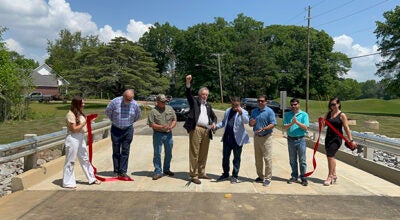Despite promise, no area meeting for One Lake
Published 9:43 pm Thursday, September 6, 2018
The deadline for public input on an engineering study for the proposed One Lake project in Jackson ended Thursday without a public meeting for cities and counties along the middle portion of the river between the capital and the state line, despite assurances Rankin-Hinds Pearl River Flood and Drainage Control District attorney Keith Turner gave to The Daily Leader in early July.
One Lake officials held meetings in Jackson, on the Coast and in Slidell, Louisiana, but Monticello Mayor Martha Watts thinks she knows why the levee board skipped the communities in the middle.
“I think that once they got wind of the amount of opposition down here they just decided to back off,” she said. “They have not made any pretense we will benefit, in any way, from this project. No one’s going to go along with it. Why would we?”
Watts and many others along the river believe the One Lake project — which would use weirs and dredging to widen and deepen the Pearl River to create a 1,500-acre lake along the border of Hind and Rankin counties in Jackson — will harm the river by reducing flows and speeding up bank erosion many believe is caused by the Ross Barnett Reservoir, built in 1963.
The One Lake draft engineering report claims the reservoir actually helped Pearl River flows and claims the new project will have no adverse effects on the river. The report also downplays the project’s environmental effect, which would drain around 1,000 acres of wetlands that provide habitat to a handful of endangered species dwell along the Pearl River and nowhere else on Earth.
Many elected leaders aren’t convinced One Lake is so benign.
The Town of Monticello is one of 12 governments downstream from the proposed One Lake project that have passed resolutions condemning it. Others include Hancock, Lawrence, Marion and Pearl River counties; the Mississippi Department of Marine Resources; the Louisiana Legislature; St. Tammany and Washington Parishes in Louisiana; and the cities and towns of Bogalusa, Pearl River and Slidell, Louisiana.
The governments have also lobbied elected leaders and the U.S. Army Corps of Engineers against the project, and a coalition of environmental groups are aligned against it.
A new antagonist to One Lake emerged Thursday, as U.S. Rep. Bennie Thompson released copies of letters his office has sent to USACE and the levee board, peppering both institutions with 54 specific questions about the project and its proposed benefits.
Thompson’s letters cite numerous provisions of federal law stretching across several federal agencies to claim the levee board is out of compliance with federal law. He called for the corps of engineers to take over the project’s public notice and review process.
“I have heard from many of my constituents about this highly controversial project who have highlighted a multitude of serious, unresolved economic and environmental issues that demonstrate its fiscal imprudence and destructive nature,” Thompson wrote. “Based on this information, including the fact that the Drainage District is not fully complying with federal law, I strongly object to One Lake and urge the Corps to reject this project.”
But One Lake is not without support.
The Greater Jackson Chamber Partnership contributed $200,000 to the project in 2012, and the Mississippi Development Authority threw in $1 million the following year. State lawmakers last year gave the levee board authority to tax property around the project area.
U.S. Sen. Roger Wicker is also shepherding the project through Washington, D.C., and has included it in America’s Water Infrastructure Act of 2018.
In Monticello, Watts and the aldermen have been doing all they can to combat One Lake’s powerful allies. Watts said the town set up a table in city hall with information on the project and invited citizens to come in and submit public comments to the levee board, with town officials standing by to assist with the submittal process.
Monticello also hosted a recent public meeting organized by the Gulf Restoration Network, an environmental coalition opposed to One Lake, and Watts spoke against the project when invited to address the Rotary Club of Columbia.
She criticized the project’s flood control selling point and raised concerns low flows along the Pearl River would be contaminated by the City of Jackson’s wastewater discharge — the city is under a roughly $700 million consent decree from the U.S. Environmental Protection Agency.
“The Savannah Street lagoon is going to be on our side of the weir, not the lake side. That’s not enough, in my opinion, to dilute what’s coming out of the lagoon,” Watts said. “That’s a disaster. Once they drain all these wetlands and dredge 25 million cubic yards out of the river, and find out this doesn’t work, it’s too late. There’s no going back.”
Turner did not immediately respond to messages seeking comment for this story.





